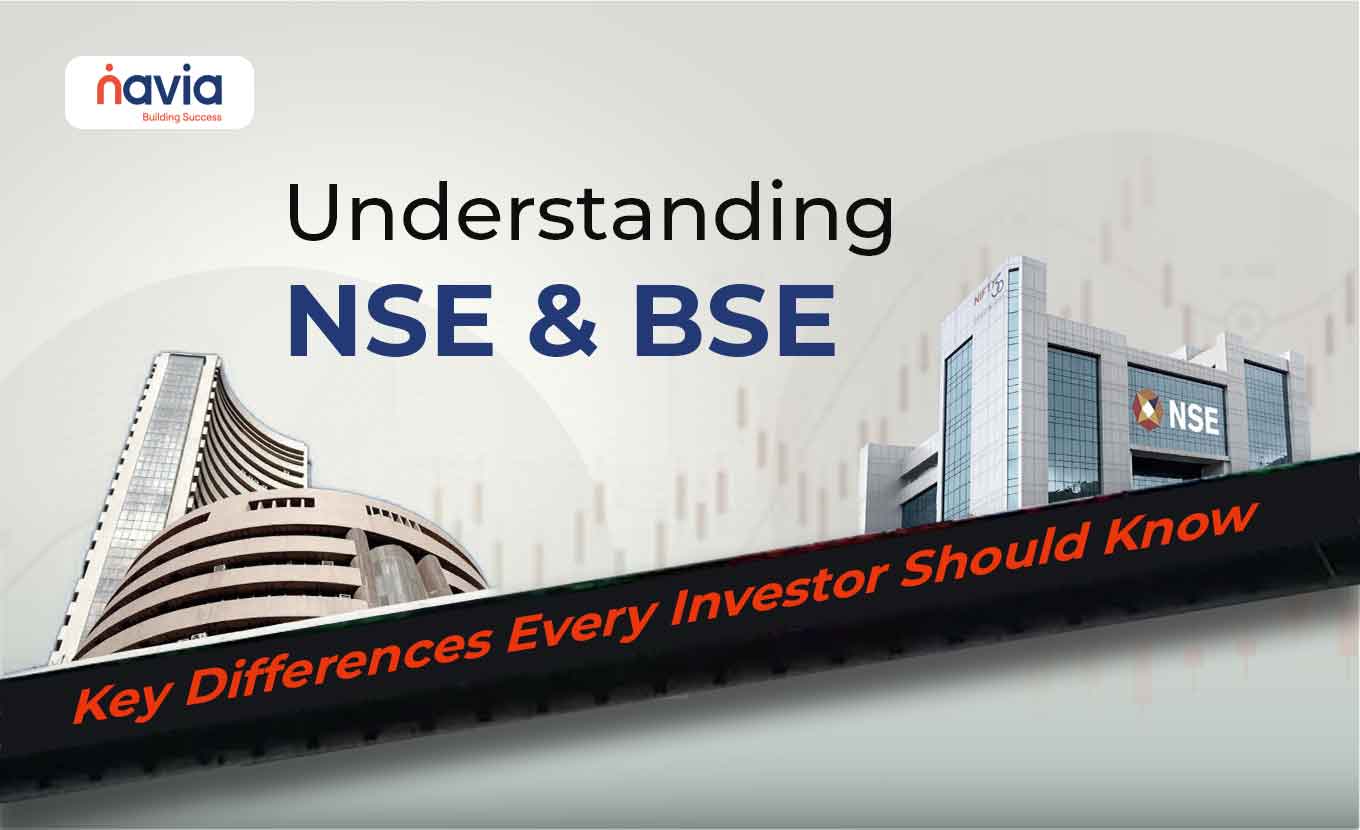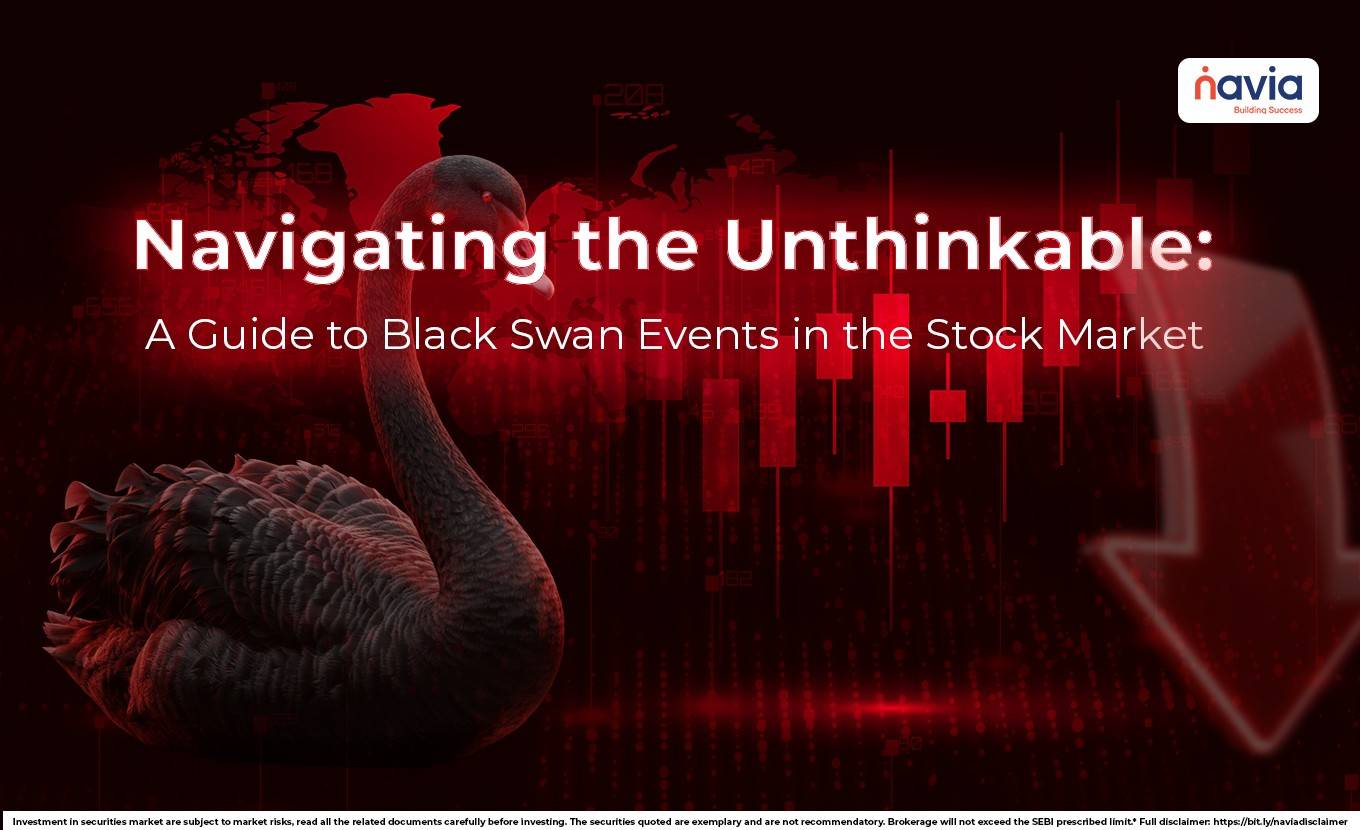What is the Difference Between NSE and BSE: Full Comparison

When stepping into the world of investing, there are two names stands out in India’s financial landscape, NSE (National Stock Exchange) and the BSE (Bombay Stock Exchange). These two are the foundations to stock trading, but they are different in their history, operations and utilities. So, understanding these differences is essential for investors to smoothen their investment journey.
The blog is a guide for you to break down what is NSE and what is BSE, and how these key distinctions matter for your investment decisions.
What are NSE and BSE?
BSE (Bombay Stock Exchange) is Asia’s oldest stock exchange, established in 1875 in Mumbai. The benchmark index is called SENSEX, that tracks the performance of the 30 large and established companies.
NSE (National Stock Exchange) founded in 1992 and it became India’s largest exchange within a short period of time. NSE introduces fully automated, screen-based trading and is known for its benchmark index NIFTY 50, which tracks the top 50 companies that are listed on the exchange.
In simple terms;
🠖 BSE = Legacy + Wide Listing Network
🠖 NSE = Speed + Higher Trading Volume
How are NSE and BSE Similar?
We can say that NSE and BSE are competitors, because they share many similarities in their function. Let’s see some similarities of them;
🔸 Both are regulated by SEBI (Securities and Exchange Board of India) ensuring investor protection and transparency
🔸 The headquarters of both located in Mumbai
🔸 Offer similar investment products like, ETFs, bonds, mutual funds, derivatives and equities
🔸 Operating on electronic trading systems that allow investors across India to participate without any physical connection
🔸 Following same trading hours both are active from 9:15am to 3:30pm (Monday to Friday)
🔸 Settlement cycles for trades are identical means, T+1 day settlement

Differences Between NSE and BSE
While they are share many similarities and some differences, here you can see a comparison;
| Feature | NSE (National Stock Exchange) | BSE (Bombay Stock Exchange) |
|---|---|---|
| Introduction | Young and biggest stock exchange | Oldest stock exchange |
| Founded in | 1992 | 1875 |
| Benchmark Index | NIFTY 50 | SENSEX |
| Companies in the index | 50 | 30 |
| Trading Volume | Higher daily volume so preferred by traders | Lower daily volume compared to NSE |
| Number of Listed Companies | Around 1790 | Around 7400 |
| Market Popularity | More popular for derivatives and F&O segment | More popular for small and mid-cap stocks |
| Network | Over 1500 cities | 419 cities |
| Technology | Fully automated from inception | Transitioned from floor trading to electronic |
| Liquidity | Higher liquidity | Liquidity can be lower |
| Official Website | www.nseindia.com | www.bseindia.com |
Choosing Between NSE and BSE: Which One Is Right for You?
The choice between NSE and BSE completely depends on your trading style and investment goals. You can see some factors about them;
🠖 For day traders & F&O traders the NSE is the preferred choice because of the higher liquidity and tighter bid-ask spreads.
🠖 For long-term investors both exchanges are equally safe but if you are looking for smaller companies you can choose BSE, because its larger list of companies might be useful.
🠖 For beginners most people prefer NSE because buying/selling is quicker due to high trading volumes.
Final Thoughts
Both NSE and BSE are playing an important role in India’s stock market ecosystem; those are offering platforms for trading a wide range of securities. NSE is most popular because of its advanced technology and higher liquidity, and BSE stands out for its legacy, reliability and speed. But the NSE BSE compare will give you a proper understanding about each exchange, after that you can make informed decisions and optimize your trading strategy in today’s dynamic market.
Both NSE and BSE provide investors with platforms to access India’s capital markets. Investors should evaluate their goals, trading style, and company preferences before choosing.
Do You Find This Interesting?
Frequently Asked Questions
Is it better to invest in NSE or BSE?
Both NSE and BSE offer good investment opportunities. NSE typically sees higher liquidity and is often chosen by active traders, while some investors prefer BSE for its legacy and broad list of companies.
Which is stronger, BSE or NSE?
In terms of trading volume and liquidity, NSE is considered stronger. However, BSE is Asia’s oldest stock exchange and is known for its speed and reliability.
What are the key differences between BSE and NSE?
The main differences lie in their indices, liquidity, and technology. BSE’s benchmark index is Sensex (30 stocks), while NSE’s is Nifty 50 (50 stocks). NSE typically has higher daily trading volumes, while BSE has a longer history and more listed companies.
What is the full form of Sensex?
Sensex stands for Stock Exchange Sensitive Index, which tracks the performance of 30 well-established and financially sound companies listed on BSE.
What is the full form of Nifty?
Nifty stands for National Stock Exchange Fifty, representing the top 50 companies listed on NSE across various sectors.
What is the largest stock index in India?
The Nifty 50 is often considered the largest stock index by representation, as it includes 50 major companies across multiple sectors and has higher trading volumes compared to other indices.
What is the trading time of BSE and NSE?
Both BSE and NSE have the same trading hours:
🠖 Pre-open session: 9:00 AM – 9:15 AM
🠖 Regular market session: 9:15 AM – 3:30 PM
🠖 Post-market session: 3:40 PM – 4:00 PM
DISCLAIMER: Investments in securities market are subject to market risks, read all the related documents carefully before investing. The securities quoted are exemplary and are not recommendatory. Full disclaimer: https://bit.ly/naviadisclaimer.






